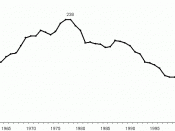Aid to Families with Dependent Children (AFDC)
Under Clinton's 1996 Personal Responsibility and Work Opportunity Reconciliation Act, the former Aid to Families with Dependent Children (AFDC) program was replaced by another, the Temporary Assistance for Needy Families (TANF). The TANF terminated such unlimited welfare rolls, or cash allowances, handed out under AFDC, and limited rolls to a five-year maximum, requiring that welfare recipients establish and maintain jobs (Oliphant 1). Despite its widespread praise, much evidence calls into question its seeming nobility, its true purpose, and its ultimate success. The following evidence suggests that dependency measurement does not provide an accurate picture of aid-dependents' situation, and that TANF is indeed a faulty program. Rather than continue to fight permissiveness and dependency, we must begin to address qualitative difficulties in their personal lives, which would better allow them to return to flourishing independence outside TANF's largesse.
The basis of TANF's purported success relies on two factors.
The first is a single quantitative finding: the number of welfare recipients dropped from 12.24 million in August 1996 to 6.28 million in June 2000, a 53% rate of decline. (Schram 3). Though this claim is technically true, its validity is doubtful. Rather, when discussing welfare roll decline, welfare exit rates are emphasized, consisting of those who voluntarily leave welfare dependency or who violate TANF policy, thereby ceasing their right to welfare rolls. However, TANF advocates conveniently fail to note increased policy restrictions, and more importantly welfare entry rates. This is a subtle, yet highly significant distortion, because "if rolls were to be reduced by merely shutting the gates on needy families, this would be viewed by many as a small and ignoble feat" (Rector 12).
TANF's alleged success resides solely on several uncertainties. First, advocates point to an undisputed drop in welfare rolls by...


